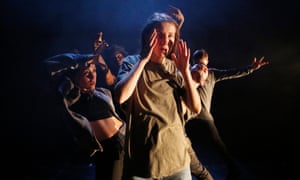
There was a thrill and a buzz around 201 Dance Company when they brought their last production, Smother, to Edinburgh. In telling the stories of two gay men and their community of friends, 201 were staking out significant new ground for hip-hop, proving that the language of street dance was supple and expressive enough to deal with complex character and emotion.
With Skin, choreographer Andrea Walker tackles even more demanding material, charting the story of one child’s journey towards gender transition. This is a theme that’s currently blowing through the theatrical zeitgeist, but the challenge of navigating its psychological and political intricacies is a particularly tricky one for pure dance.
Smartly, Walker opts for images of graphic simplicity to establish the premise of his story. Two figures stand facing each other, identically dressed in jeans and a knitted cap. They’re the child and adult versions of Michael, Walker’s protagonist; as they pull off their caps and shake out their hair, as they reluctantly revert to wearing dresses, it’s made unambiguously clear that Michael was born female.

Walker finds powerful movement imagery to show how alienated Michael feels within his body. Michaela Cisarikova as the adult Michael distills a harrowing level of tension into her angled, robotic moves, tugging at her dress as if it was burning her skin. Flashing back to childhood, little Michael (Candy Dickinson) is groomed by her mother (Lara Rose McCabe) to look and move like a girl. But she can’t make sense of her mother’s brittle manikin posing, her high heels and tight dress. Her body eases into confident joy when Michael finds an adult male to follow and can mimic his sturdy slouch, or attempt her own, giggling version of his gregarious B-boy moves.
The social pressures on Michael as s/he gets older are neatly encapsulated by a group dance in which s/he’s caught between sexually aggressive men, and women who want to trade makeup and clothes. Yet as cleverly as Walker sketches the narrative basics, as fine and committed as his dancers are, Skin doesn’t develop into a fully felt or fully imagined drama. The characters surrounding Michael – especially his mother – are limitingly schematic, and the choreography for everyone, except Cisarikova, looks underworked. When Michael finally commits to being a man, it all feels too tidy – a diagrammatic conclusion rather than the outcome of a lived experience.
Source:-Theguardian
